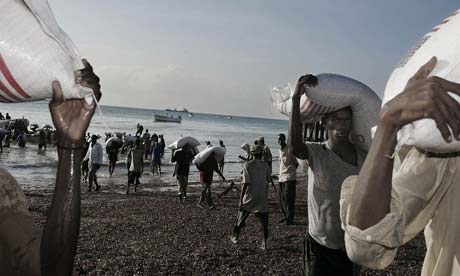
Somalian men unload sacks of sorghum provided by the UN's world food programme. But much aid does not reach its destination. Photograph: Jose Cendon/AFP/Getty
Up to half the food aid meant to feed hundreds of thousands of hungry people in Somalia is being stolen, according to a leaked UN security council report.
The report, seen by the New York Times, says the food is being diverted to corrupt contractors, radical Islamic militants and local UN workers. It advises the UN secretary general, Ban Ki-moon, to open an independent investigation into the organisation's world food programme operations in Somalia.
The losses are blamed on improper food distribution and the country's war-ravaged infrastructure.
The bags of food have to be driven through roadblocks manned by a bewildering array of militias, insurgents and bandits.
Not only are kidnappings and executions common, the country's insecurity also makes it difficult for senior UN officials to travel to the country to check on procedures. Investigators who do go there run the risk of relying for protection on the same people they are examining.
A UN diplomat, who did not wish to be named, told Associated Press that a significant amount of food delivered by the UN food programme was being diverted to cartels who were selling it illegally.
Although nearly half of Somalia's 3.7m people need aid, the country's main extremist Islamic group said earlier this year that it would stop the UN's food programme distributing food in areas under its controlbecause it says the aid undercuts farmers selling recently harvested crops.
The group, al-Shabaab, also accused the agency of handing out food unfit for human consumption and of secretly supporting "apostates" who have renounced Islam.
The UN's ability to conduct investigations was badly damaged in 2009 when it dissolved its special anti-corruption unit, the procurement taskforce, three years after its establishment. Investigations are now conducted by the office of internal oversight services' permanent investigation division.
An AP analysis in January found not a single significant fraud or corruption investigation was completed in 2008 out of about 150 begun. Five major corruption cases were halted.
A spokesman for the world food programme, which is based in Rome, said it would not be commenting until it had studied the report.
A Nairobi-based spokesman for the programme had previously said that internal investigations showed between 2% and 10% of aid was being sold.
The US reduced its funding to Somalia last year after its treasury department said it feared that aid could be diverted to al-Shabaab, which the Americans say has links to al-Qaida. The issue remains unresolved.
The report also found regional Somali authorities to be collaborating with pirates and says that government ministers have auctioned off diplomatic visas.
However, the Somali finance minister, Abdirahman Omar Osman, denied the charge. "We don't sell visas. That is not true," he said, adding that his government would investigate the allegations.
Somalia's government is readying a military offensive to combat an Islamist insurgency linked to al-Qaida and to retake Mogadishu, the capital. The insurgents frequently attack government forces in the city and stage public amputations with impunity.
However, the report described the security forces as "ineffective, disorganised and corrupt".
The issue of aid distribution has been in the news over the last week following a BBC World Service programme which claimed that 95% of the $100m (£67m) aid raised to fight famine in northern Ethiopia was diverted by rebels and spent on weapons.
The allegation prompted a furious denial from the veteran aid campaigner Bob Geldof, who threatened legal action and called for a string of resignations at the World Service.
Others, however, have argued that any allegations over the misuse of aid have to be investigated.
The former BBC correspondent Rageh Omaar, who was born in Somalia, provoked Geldof's ire by saying that humanitarian operations in disputed territories were "almost always politicised and misused".
He added: " The idea that this never happens and that NGOs are never put in situations where, in order to get the aid delivered, they have to work with and often through the powers that control the territory where the suffering is taking place is a ridiculous fantasy.
"It's happening now, in Congo; in my own country, Somalia, where al-Qaida-affiliated groups have dictated how the world food programme delivers emergency food; and also in Zimbabwe, where I have just spent two weeks talking to aid workers having to work through government bodies in delivering aid to prisoners of Mugabe."




No comments:
Post a Comment